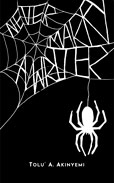
 |
"Never marry a writer," warns this powerful and deceptively relevant collection of poems. After all, a writer is apt to memorialize anything and everything. A writer chronicles and exposes, captures and recounts, leaves no deed or fact inside the privacy of a marital union. Whatever the situation, a writer will write, spill ink along with secrets, reveal and reframe private doings, and recognize no boundaries as a natural chronicler of life experience and observation. Nothing is off-limits, and any assumption of privacy is the spouse's folly. Flaws, truths, hurts, and betrayals are all potential fodder for the page. Yes, each poem in this revealing book testifies to the title's warning. The collection holds up the most private life experiences to the glaring sunlight of published words.
Poetry is an essential tool of collective memory and relating. Without the poet laying bare the most lurid and private moments from a varied and vibrant life, would one remember those deepest feelings and, more importantly, realize and remember that so many of one's most personal experiences are actually universal? Deception, heartbreak, revelation, disappointment, cruelty, anticipation, and regret are all cozily ensconced in these pages, volleying between generations and lovers and among friends. This poetry takes readers to their darkest and most revelatory moments, reminding, stoking, and empathizing. These are the writer's stories but, like all good poetry and memoir, they are the reader's too.
The revelations don't stop. Birth, death, and ghosts visit these pages. Then comes the current and political, never far from the personal, but even more intertwined and potent when baked into this poetry. "The news gives me nightmares," writes the poet. Among the chronicles of life's interpersonal dramas, this collection delivers fresh commentary on life during the coronavirus crisis. In "7 days, 7 lines," the mundanity of regular daily life and its generic and frenetic pursuits inside quarantine is juxtaposed with the horror of staying safe, healthy, and functional during the pandemic. This is real life on display with a poet's smirk, proving that even a virus should take note that when one waltzes with a writer, details of the dance will find their way onto the page.
Indeed, it is impossible to read entries such as "Paranoia," "Prayer," and "Sleepless Nights" without feeling the familiar human weight of the pandemic and its lifestyle side effects. The opportunities and perils of watching television, streaming entertainment content, gardening, and the wasteland that is social media are not spared, each receiving a searing filet of truth and a mirror to all living through the harrowing year 2020.
Yet even for a writer, is there a topic too painful, too serious, too consequential for words? The collection doesn't shy away from the inevitable question of how a writer can bother with words and prose in the face of calamitous realities like disease, terrorism, and war. Is it a mockery or a chronicle to capture evil and make it artistic? "How do I write a poem without my tears wiping the words from these pages?"
Ultimately, the poet's caution to "Never Marry a Writer" is a deeper disclaimer, a warning that is more a promise. Writers, these poems remind the reader, bear witness. Whether evocative prose or colorful whimsy or the bleakest of forthright documentation, their words attest to the truths they observe. With its wily wordy ways, this collection reminds readers that even those without a literary spouse are nevertheless subject to—and on notice from—those who, like the author, observe and document.
RECOMMENDED by the US Review